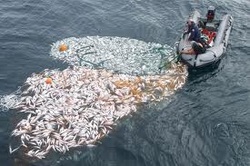 www.bluepeacemaldives.org
www.bluepeacemaldives.org In one of the many wars between self-interest and Mother Nature, an agreement has been reached. This morning, the announcement came that the UK has secured new laws with the European Union over the controversial dumping of unwanted fish.
The existing system of fishing quotas, which often leads to tones of perfectly good fish being dumped at sea, will be reformed. 75% of stocks are still overfished and catches are only a fraction of what they were 15-20 years ago. Catches of cod for example have declined by 70% in the last 10 years. Up till now, crews that haul in more than the agreed quota often throw large quantities of dead fish back into the sea. Over time Europe's fishing fleets have grown too large for the dwindling fish stocks, but fisheries ministers are often reluctant to see their national total allowable catches reduced.
 www.3news.co.uk
www.3news.co.uk And another consideration: In these times of hunger and famine, the waste seems shocking to me. Three-quarters of all hungry people live in rural villages of Asia and Africa. Overwhelmingly dependent on agriculture for their food, these populations have no alternative source of income or employment. As a result, they are vulnerable to crises. Many migrate to cities in their search for employment, swelling the ever-expanding populations of shanty towns in developing countries.
I took a moment to check on facts about the world hunger statistics.
 www.worldculturepictorial.com
www.worldculturepictorial.com Total number of children that die every year from hunger 1.5 million
Percent of world population considered to be starving 33%
Time between deaths of people who die from hunger 3.6 seconds
Total number of people in the world who suffer from hunger and malnutrition 800 million
Total number of people who do not have enough to eat 936 million
Total percentage who do not have enough to eat in developing countries 98%
Total percentage of world’s hungry that live in 7 countries 65%
Number of people who died of hunger today 20,864
Total number of people who will die of hunger this year 7,615,360
Total percentage of U.S. households that are at risk of hunger 11%
They are distributed like this:
578 million in Asia and the Pacific
239 million in Sub-Saharan Africa
53 million in Latin America and the Caribbean
37 million in the Near East and North Africa
19 million in developed countries
Let sense prevail.
God bless us all.

 RSS Feed
RSS Feed






